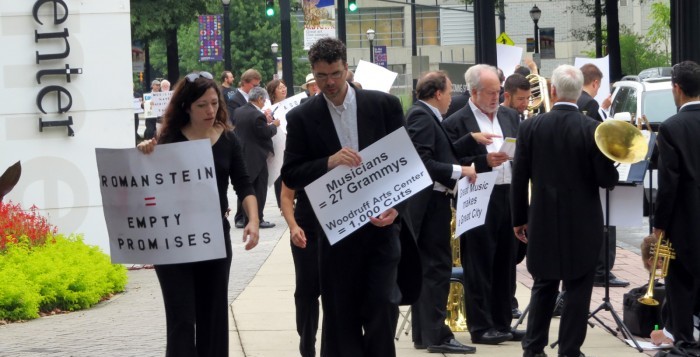
Atlanta Symphony Orchestra musicians have been out of contract since Sept. 6, leading to picketing across from the Atlanta Symphony Hall. Representatives of both
the musicians and the Woodruff Arts Center have been in negotiations with no success thus far. | Courtesy of Mark Gresham
By Emily Sullivan
Staff Writer
Two months later and the Atlanta Symphony Orchestra (ASO) conflict continues to persist.
Although excellence shouldn’t be negotiable, ASO musicians remain locked out of the Woodruff Arts Center (WAC) due to numerous failed deliberations. Since the lockout began in early September, musicians’ health care benefits have dwindled away and for some, financial situations are no longer comfortable.
Several orchestra members have resorted to part-time jobs, out of concern for families, loans and meals.
Nevertheless, management continues to treat its musicians disrespectfully, although not intending malevolence.
With maintenance of the budget in mind, managers are refraining from compromising with musicians’ contract requests; these requests include a modestly, slowly increasing salary and a full 89-seat orchestra, rather than the current, underwhelming 77-seat format. Some ASO musicians have also advocated for a longer working season, as the multitude of cancellations have resulted in lost income.
Reasonable as the requests for a better salary and to maintain reputation may be, a deadlock of compromise is forcing musicians and management alike to face extreme frustration.
A Facebook post from ATL Symphony Musicians exemplifies the frustration and ensuing pressure that is currently affecting both parties. On Oct. 23, they posted, “the Woodruff Arts Center representatives for the Atlanta Symphony Orchestra walked away from the table after three days and almost 40 hours of talks.”
Although management is not intentionally depriving its musicians of performance opportunities and salaries, musicians are suffering. No specific budget proposal has been met with agreement; it may be time for negotiators to act boldly and to take more risks in terms of proposals. In the 2012 ASO lockout, the ASO Players’ Association proposed that they would accept an 11 percent pay cut “if the orchestra’s senior management staff agreed to take an equal pay cut,” according to The Huffington Post article, “Atlanta Symphony Orchestra Stops Paying Musicians, Locks Them Out Of Facility.” Further pay cuts to both sides may not be an appropriate solution, but further creativity is necessary either way in order to alleviate the musicians’ situations.
A federal mediator – who is expected to provide a new, much-needed perspective – was recently introduced to the table, legitimizing the situation to the point where negotiators cannot speak out to media personnel. However, while many negotiation details remain undisclosed, posts from ASO accounts, including the ATL Symphony Musicians’ Facebook update, have proved capable of attracting public attention – and for the best.
Musician-supporting Twitter feeds, Facebook accounts and more have flooded the Internet and have gained the attention of orchestras from the San Francisco Symphony to the New York Philharmonic. While ASO musicians display their picket signs outside the WAC, various organizations convey their support via encouraging hashtags and photos.
The support continues in the offline world. “I Support ATL Symphony Musicians” was seen plastered onto the side of a car, and MARTA union members picketed with ASO musicians. Inside the Rome Opera House, where an entire orchestra and choir were recently fired, the ASO musicians and their individual situations are supported and represented.
Additionally, university faculty and students are becoming involved in the rally to preserve each ASO musician’s well-being. Emory University’s own Symphony Orchestra and Youth Symphony Orchestra conductor, Richard Prior, has been acting as a conductor to small groups within the orchestra. According to Geoff Edgers of The Washington Post, Prior is currently leading such groups’ performances in remote venues, including local clubs.
On Oct. 10, Georgia State University students became involved when they banded together in a public musical improvisation to draw attention to the orchestra’s struggle. Displaying signs reading, “Save Your Symphony” and “ASO, We Won’t Let Go,” this performance brought the Symphony Hall disputes into another real world setting. The performance, appropriately called “Out of the Hall, Into the Streets,” is featured on YouTube and has been shared through the various avenues of social media.
While we wait for mediations to finalize, hoping that they finalize quickly and in favor of the musicians, the general community must continue to encourage its musicians in any way possible.
This encouragement must continue into future seasons, as fundraising is a major concern and a major factor influencing the lockout. In an interview with The Atlanta Journal-Constitution, Governing Board Chairman of the WAC Douglas Hertz claimed, “The sad part of it is … there are not enough people that care. When you’ve got less than 5,000 donors in a metropolitan area of 5 million, that’s my concern.”
Management does in fact care about the well-being of its musicians and its orchestra, but unfortunately, this doesn’t compensate for the fact that many ASO musicians are facing difficult situations of uncertainty.
The 2012 ASO lockout lasted far too long and included a vast array of cuts: pay cuts, seat cuts and season-length cuts. If more cuts are executed throughout the orchestra in 2014 and leading into 2015, many members will be indefinitely without a home stage and without steady income. The Atlanta Symphony Youth Orchestra members will be without their supply of productive, reliable and experienced instructors, and Atlanta will be without its own Symphony Orchestra.
In New York, the Met Orchestra recently overcame similar contract disputes. Keeping in mind the power of social media, including the ASO’s Facebook posts, the Met Orchestra’s Rob Knopper suggests that the community take several steps in order to support Atlanta musicians’ troubles while they rally for their families and collective futures. Knopper suggested to “like ATL Symphony Musicians. Like, comment and generally heap positive attention on them. Follow @ATLSymMusicians. Retweet, favorite and reply to every one of their tweets. Follow all the important blogs.”
At the very least, abide by one musician’s picket sign and “honk if you love ASO.”
– By Emily Sullivan, Staff Writer
The Emory Wheel was founded in 1919 and is currently the only independent, student-run newspaper of Emory University. The Wheel publishes weekly on Wednesdays during the academic year, except during University holidays and scheduled publication intermissions.
The Wheel is financially and editorially independent from the University. All of its content is generated by the Wheel’s more than 100 student staff members and contributing writers, and its printing costs are covered by profits from self-generated advertising sales.






